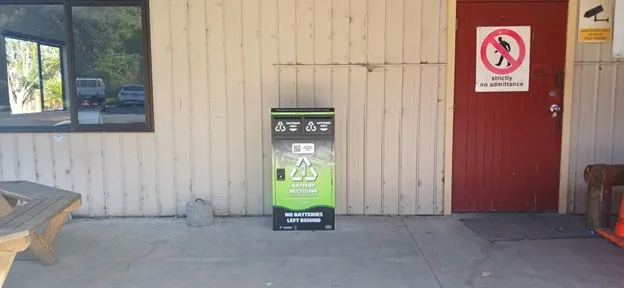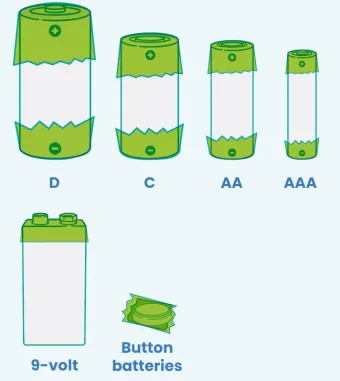Used batteries are a special waste, that need separate disposal and recycling. Think before you toss. Never bin your batteries. Batteries can explode and ignite fires in rubbish trucks and landfills. Take them to a safe disposal point.
Household battery recycling
Small household batteries, commonly used in everyday devices around the home, can be saved and dropped off free of charge, at our Resource Recovery Centres in Whakatāne and Murupara. The unit below (at Whakatāne site only) will accept household batteries, under 5kg, only.

Larger household batteries can be left on the crate next to the battery recycling unit in the recycling drop off area.
For any battery disposal in Murupara, please see the person on site for safe storage and disposal
Collection points
Dead batteries? It's free of charge to recycle them.
- Whakatāne Resource Recovery Centre – two dedicated battery recycling units (see picture above).
- Murupara Resource Recovery Centre – batteries are collected and transferred to Whakatāne for safe recycling.
- Other locations – Waste Zero Whakatāne stall at the first Sunday Market each month, Bunnings, and Supercheap Auto (for car batteries only).
How to prepare your batteries for drop-off
All batteries, including small coin/button batteries, need to have the terminals taped over, using clear sticky tape (preferred), or non-conductive electrical or duct tape.
Avoid hazards: Do not store batteries with flammable or conductive materials like metal, paper clips, or staples.

Types of batteries we accept
The following types of household batteries can be accepted for recycling
Small batteries (under 5kg)
- Alkaline batteries common types: AA, AAA, C, D, 9V
Used in remote controls, flashlights, clocks, toys, etc. - Lithium batteries common types: CR2032, CR123A, AA Lithium
Used in watches, cameras, key fobs, smoke detectors, etc. - Rechargeable batteries common types: Nickel-Metal Hydride (NiMH) AA, AAA; Lithium-ion (Li-ion)
Used in cordless phones, cameras, toys, portable electronics, etc. - Button or coin cell batteries common types: CR2032, LR44, SR44
Used in watches, hearing aids, calculators, small electronic devices, etc. - Zinc-carbon batteries common types: AA, AAA, C, D
Used in remote controls, clocks, low-drain devices, etc. - Nickel-cadmium (NiCd) batteries common types: Rechargeable AA, AAA
Used in cordless phones, emergency lights, power tools (less common now due to environmental concerns), etc. - Lead-acid batteries (small-scale) common types: 6V, 12V (small, sealed lead-acid)
Used in emergency lighting, backup power supplies, alarm systems, etc.
Large batteries (over 5kg)
- Lithium phosphate batteries: Rechargeable LiFePO4 batteries used in energy storage and other applications.
- Nickel-cadmium batteries: Rechargeable batteries found in power tools, laptops, and energy storage systems.
- Removable Lithium-ion embedded batteries: Found in larger devices like power tools and some energy storage systems.
- Automotive batteries: Lead-acid batteries from vehicles.
- Forklift batteries: Lead-acid batteries used in forklifts, including those with steel casings.
- Industrial batteries: Lead-acid batteries from uninterruptible power supplies (UPS), gel batteries, and other industrial power storage systems.
Vape batteries
We accept vape batteries. Tape terminals where possible or check if the vape company offers a recycling service, e.g. Vuse Repod Recycling.
For more information visit Phoenix Recycling website.
Note: Damaged or swollen batteries must be taken to our Resource Recovery Centre and taken to the kiosk (the small office near the weighbridge) for proper disposal.
Group packaging small batteries
For small batteries like AA, AAA or button batteries, first tape over the exposed terminals and place up to 10 batteries together in a single plastic bag if you prefer.
Combining different types
While it's helpful to separate batteries by chemistry (e.g., alkaline, lithium, NiCd), it's not required so long as each battery's terminal has been taped over.
E-waste
We recycle smartphones and power tool batteries. However, other electronic waste, such as TVs, laptops, and tablets, are not recycled at the Resource Recovery Centres and should be taken to CReW (charges apply) or Noel Leeming for recycling.
Frequently Asked Questions
- Where are drop-off locations for batteries?
- Whakatāne Resource Recovery Centre (60 Te Tahi Street).
- Murupara Resource Recovery Centre.
- Waste Zero Whakatāne stall (first Whakatāne Sunday Market each month), Bunnings, and Supercheap Auto (car batteries only).
- Is this service free?
Yes, it is a free community service.
- What battery types are accepted?
Household batteries under 5kg (AA, AAA, coin/button cells, etc.) can be placed in recycling units.
Larger household batteries, like car batteries, can be left on the crate next to the battery recycling unit in the recycling drop off area.
- What if batteries are damaged?
Please take damaged batteries to the Whakatāne kiosk (office near weigh bridge) or the person on site in Murupara for proper disposal
- How should I store batteries before drop-off?
Tape the terminals (the positive and negative points of the batteries, which can be on the top, bottom, or both) or individually bag different types of batteries. Keep them away from flammable or conductive materials.
- Are commercial quantities accepted?
No, this service is for households only. Businesses should contact Phoenix Recycling (or another commercial operator) for commercial options.
- What happens to the collected batteries?
Phoenix Recycling ships batteries offshore for safe recycling and recovery of reusable materials.
- Do you accept e-waste?
No. E-waste should be taken to CReW (charges apply) or Noel Leeming for recycling.
- Who do I contact for business battery recycling?
Contact commercial recyclers like Phoenix Metals at 0800 BATREC (0800 228 732) or email battery@pmrnz.co.nz
- What about vape batteries?
We accept vape batteries. Tape terminals where possible, or check if the vape company offers a recycling service, e.g. Vuse Repod Recycling.